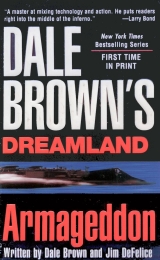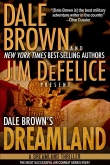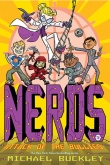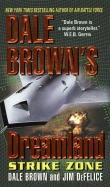
Текст книги "Armageddon"
Автор книги: Dale Brown
Жанр:
Боевики
сообщить о нарушении
Текущая страница: 12 (всего у книги 20 страниц)
“Couple of weeks,” he said.
“Where did the sultan go?”
“Couldn’t tell you.”
“We control the city. We will find him. When will the Americans come?”
“Which Americans?” Mack asked.
“Your marines,” said Sahurah.
“Any second,” said Mack.
Sahurah turned to one of the men at the door and said something in Malaysian. The man nodded and left.
“You will be fed,” he told Mack. “A cot will be brought. If you are mistreated, the man who does so will be punished”
“That’s awful nice of you,” said Mack, unable to control his sarcasm.
“No, it is merely the way the law directs a prisoner be treated,” said Sahurah, interpreting the words, not the tone. “I remind you that if you attempt to escape, you will be executed.”
“That’s the law, too?”
“Yes,” said Sahurah. He bowed his head slightly, then turned and left the room.
* * *
THE PAIN IN HIS HEAD WAS SO INTENSE THAT SAHURAH HAD to pause in the hallway and rub the sides of his temples in an effort to get it to stop. He had much to do and could not afford to stop now, even for such pain. He needed to find men who could tell him about the aircraft here; he needed to survey weapons, to prepare defenses for a counterattack, to make sure all of the brothers were being fed, to find a way to welcome the new recruits who were sure to pour in to their lines now that the decadent order had been swept away.
The Brunei pilot and the others who had been with Smith had been shot in the cockpit unwisely by the brothers who took the plane. Apparently one of the soldiers who had followed Smith down the ladder had started to fire, and from that point on there had been little discipline among the attackers. It was a miracle that the American had been spared, though Sahurah did not know what exactly was to be done with him; surely he could not be trusted in the aircraft.
“Commander, the Malaysians who were sent to man the antiaircraft weapons are complaining about their air-conditioning.”
The voice sounded as if it came from the opposite end of the hallway, but when Sahurah turned he found the man who had spoken just a few feet away.
“What is their complaint?” asked Sahurah.
“The air-conditioning needs to function or their equipment will not,” said the man.
“Find Salem the Yemen and tell him that a technician is needed to repair it.”
“Yes, Commander;” said the man, spinning away immediately.
Sahurah once more closed his eyes. He wanted to rest. But God did not want him to, not yet. And he must accept the wishes of his Lord. He took a breath that filled his chest, then resumed his inspection of the airport.
Aboard EB-52 “Penn,” approaching Brunei
13 October 1997, 0428
Zen waited as the computer that helped him fly the U/MF-3 Flighthawk counted down the time to launch from its mothership, the EB-52 Pennsylvania. Numbers drained in the main control screen, which replaced the visor in Zen’s helmet. The projections helped make it seem as if he were inside the small aircraft, and in fact he generally felt as if he were, as he flew. The screen was divided in half; the top showed a video supplied by one of three Flighthawk sensors at the front of the airplane, usually an optical feed, though he could select an infrared or synthetic radar view instead. The panel below this main screen was divided into three different views. The one at the right showed his instruments, or rather a summary of those important at any given moment. The one in the middle was a “sit rep,” or a situation representation, a kind of God’s-eye view that showed the Flighthawk, its mother ship, and anything else within fifty miles. The data was actually provided by a link with the EB-52, constantly checked and updated by the Flighthawk communications and control computer, dubbed C3. At the far left, Zen had a view synthesized from the long-distance radar feed from Penn’s AWACS-style radar, also presented as a God’s-eye view. He could change the displays as needed, but preferred this arrangement when he was just flying one aircraft.
The Megafortress tilted its nose downward, beginning a shallow dive that helped increase the separation forces on the robot aircraft, making it easier to launch. The computer hit zero and Zen felt his body shifting exactly as if he were sitting in the tiny little bird that rushed from the wing. The engine flared and he nudged his stick forward and slightly to the left, diving into an arc that would take him toward the oil platform they had to survey.
“Hawk One is away,” he told Dog, who was piloting the mothership.
“Penn acknowledges.”
“Platform at ten miles. Approaching as planned.”
Zen put his finger against the throttle slide, notching down his power as he approached the platform. The structure had a pair of exposed decks about twenty feet from the waves. The decks ran around three sides. At the rear of the platform sat what amounted to a prefab ranch house at the top. The platform was smaller than those Zen had seen in the Gulf of Mexico, and a bit less elaborate—there was only one satellite dish, for instance, and no helipad. The flat roof of the trailer was just big enough for the Quick Bird helicopters the Whiplash team was riding in.
There were no ships or boats nearby. Zen took the Flighthawk through an orbit about seven thousand feet over the platform, descending gradually to allow the infrared camera in the Flighthawk to get a good look.
“Clean so far,” Zen told Dog.
“We copy,” said Dog, who was looking at the feed on his own display.
Two more passes and he saw nothing.
“I’m going to clear Danny in,” said Dog. “Let’s head over toward Brunei International Airport and have a look at the Megafortress.”
“Roger that,” said Zen, starting to climb away from the ocean.
Brunei, near the Malaysian border
0430
The helicopter brought enough fuel for only one Dragonfly. McKenna decided she would use it to scout the jungle, then escort the helicopter to the stronghold. Assuming things went well, she’d take a run over the southern part of the kingdom and scout out positions for the army people at Medit and Sukang, where the last report had the army under constant fire.
The sultan gave her a tired but nonetheless enthusiastic smile as she headed for her plane. “I owe you a great deal, Miss McKenna.”
“Don’t worry about it,” she said.
“She’s a rough one, but a tough one,” the sultan commented in Malaysian to one of his aides, apparently forgetting she spoke it. “We need more of that.”
McKenna snorted to herself, then went to her aircraft at the end of the runway. Just as important as the fuel, Prince bin Awg had managed to find two mechanics to tend to the aircraft; they brought enough tools and parts with them that McKenna thought they could build one of the Dragonflies from scratch.
One thing about operating on a shoestring out of a jungle camp—there wasn’t a lot of hassle with the control tower. McKenna started her engines, checked her thrust, made sure the control surfaces moved in the right directions, and let it rip. The plane bucked as the wheels hit one of the mud holes—unavoidable because of the narrow path—but picked her nose up without a problem well before the trees.
McKenna tucked her wing toward the Belait River, which ran a crazy pattern up the southern Brunei countryside from the South China Sea. Both the river and the nearby roads, what little she could see of them, were deserted.
“Good to go:’ she told the helicopter pilot. “Let’s do it quick.”
“Brunei One,” acknowledged a familiar voice. The sultan, an experienced pilot, had taken the controls himself.
Brunei International Airport
0430
Mack felt the cold hand grab his throat. He jerked nearly straight up and practically fell off the cot.
“I apologize if I startled you,” said the man who had interrogated him last night, Commander Sahurah Niu. “I trust you have rested.”
“Oh, yeah. Hell of a sleep. Thanks for the cot.”
“Put on your shoes and come with me,” said Sahurah.
“Come where?”
“I wish you to show me the aircraft.”
Mack frowned as if he were reluctant to do so, hesitating just long enough for Sahurah to tell him that, while prisoners had to be treated with respect, that commandment applied only to those who were obedient.
“All right,” said Mack, pulling his shoes on. He ran his hand over his jaw, scratching the nearly two-days-worth of growth there. “Can I get some coffee at least?”
Sahurah said something to one of the men at the door.
“The coffee will be brought to the plane. I wish to complete my tour before dawn.”
“I’ll take you wherever you want,” said Mack, hopeful now that he’d be free inside a few hours.
Aboard EB-52 “Penn,” approaching Brunei International Airport
0502
Dog kept his eyes on the image displayed by the Flighthawk as he flew the Megafortress in a double-eight pattern about ten miles from the runway. He could see the Megafortress sitting in front of the hangar as he rode the Flighthawk in toward the large hangar in the military half of the complex. He couldn’t help but think about his daughter Breanna. A few days earlier and she would have been captured along with Mack.
Assuming he’d been captured. No one had heard from him, and it was possible that, like Deci Gordon, he had managed to escape and was simply hiding out.
Though that didn’t quite seem like Mack’s style.
“Any radars?” Dog asked his copilot, Kevin McNamara. “Negative”
“Hawkins, how are the radar sweeps looking?”
“Clean,” replied Lieutenant Jesse Hawkins, one of the two radar operators who had stations just behind him on the extended flight deck. “Quick Bird helicopters are approaching the platform. They’re running slightly ahead of schedule.”
“Good.”
“They have two guards on the road, no one close to the aircraft,” Zen told Dog. He nudged the Flighthawk down through four thousand feet, taking a slow turn above the hangar and parking area. Several Dragonflies were lined up near the hangar; Zen had been told during his visit that all of the aircraft were inoperable because of serious maintenance issues. Another Dragonfly sat wrecked near the end of the runway. The two helicopters used by the air force were missing, as were the three other operational Dragonflies; they knew from earlier reports that at least one of them had crashed after being hit by small arms fire yesterday.
Over on the civilian side of the vast complex, a 757 sat next to the terminal building and another aircraft sat alone at the far end of the parking area. That airplane looked like a 707; its nose slumped downward and Zen guessed that its front gear had been disabled.
Two Hawk anti-aircraft batteries guarded the airport, along with four Panhard M3 VDA anti-aircraft weapons. The American-made surface-to-air Hawk missiles were old models, though still deemed reliable by the Pentagon briefers. While they were potent weapons, they required a highly trained crew; Zen could tell from his radar warning receiver that their associated radars had not been activated. The Panhards were armored cars with a pair of twenty-millimeter cannons mounted on top; these could be fired by radar or manually sighted and as a practical matter were likely to be more of a hazard. But they, too, seemed silent.
“Have some activity near the terminal area,” said Zen, spotting it as he came back around. “Looks like there’s a gun emplacement on the road in, machine guns I think. That wasn’t there when I was here. I’m going to take a pass at rooftop level. Hold on—looks like somebody’s heading toward the Mega-fortress”
“Target the Megafortress,” Dog told his copilot. “Get ready to take it out.”
Brunei International Airport
0505
Mack recognized the low hush of the Flighthawk engine as it approached from the north.
Zen and his stinky, lousy timing, he thought to himself. He froze on. the tarmac.
“What?” demanded Sahurah.
“Down,” hissed Mack as the Flighthawk buzzed down less than a dozen yards away.
Aboard EB-52 “Penn,” approaching Brunei International Airport
0506
Dog swung the Megafortress out of its orbit, lining her up for a direct shot at the airport.
“I have the Megafortress,” said McNamara. “It’s far enough from the civilian side of the airport that we shouldn’t cause any collateral damage there, but the hangar in front of it will be wiped out, along with most of the apron. If it’s fueled, it’ll be a hell of a fire.”
“Understood,” said Dog.
“Range is ten miles,” said the copilot.
“Bay,” Dog told him, giving the order to open the bomb-bay door. A GPS-guided smart bomb rotated to the bottom of the launcher, ready to fire.
“I could be mistaken,” Zen said over the interphone. “But I think that’s Mack near the plane. I’ll go back through the video freeze-frame images in a second. That might even have been Deci with him, wearing a flak jacket.”
Dog immediately started to level the plane, breaking off his attack.
“Colonel?” asked McNamara.
“Let’s see if we can figure out what’s going on down there,” Dog told him. “I’d prefer not to have to kill our people.”
“Yes, sir.”
IT WAS HIS WALK THAT HAD GIVEN HIM AWAY—ZEN WOULD recognize that strut anywhere. And sure enough, the enlarged image in the screen had the familiar buzz cut and crooked smile that said Mack Smith had an ego so large most days he didn’t need an airplane to get off the ground.
“You sure it’s Mack?” asked Dog.
“Looks like him. The flight suit looks like his, and there aren’t too many six-foot Anglos around here. His cowboy boots, I think.”
The boots, made from alligator, cinched it for Zen.
As Zen swung the Flighthawk over the airport again, he told the computer to push the infrared sensor settings to their maximum setting. The Megafortress was a dull brown in the screen—the engines weren’t on.
“I don’t think she’s fueled,” he told Colonel Bastian. “Nobody aboard.”
“You think we could land and pick them up?”
Zen was just about to tell him that was too crazy an idea when McNamara broke in.
“Radar up!” warned the copilot. “One of the Hawk missile batteries.”
Zen mashed the throttle as the radar-warning indicator showed that he was being targeted.
“Out of there, Zen,” Dog said. “Everybody hang on.”
“Missiles in the air!” shouted McNamara.
Off the coast of Brunei
0515
Danny Freah could see the shadow of the derrick in the distance, rising up over the platform a few miles away. The Dreamland Quick Birds had made good time getting here.
A good thing, too. The helicopters were many things—fast, reliable, heavily armed—but comfortable they were not. Their seats had about as much padding as a metal washboard.
Danny pulled on his smart helmet, which allowed him to communicate with the rest of his team and the helicopter pilots. The helmet’s visor included a panel that could be used to display feeds from video and infrared cameras at the top of the helmet, as well as images from other team members and an array of sensors.
“All right, we do this the way we drew it up,” Danny told them. “Team one rappels down, then team two. We secure the facility, make sure the roof can take the helicopters’ weight, then land. Questions?”
Danny waited for Boston’s wisecrack. He was almost disappointed when it didn’t come.
“Sergeant Liu, we, ready?” he asked Liu, who was heading team two in the second chopper.
“Ready, sir.”
“All right, pilots, your move.”
Unlike conventional helicopters, which used tail rotors to help them maneuver and remain stable in flight, the Quick Birds used a system similar to the “Notar” McDonnell Douglas had developed for the MD 530N version of the basic design. The innovative design made the small helicopter even more maneuverable, and the pilot was able to swing in close to the large metal framework as he and Danny gave it the once-over.
“Let’s do it,” said Danny.
The three men who’d been sitting in the rear compartment had already readied their ropes, anxious to get out of the cramped quarters of the scout. Danny was the last one down, his boots clunking on the metal roof of the small building that sat above the double deck of the platform. Just as he let go of the rope he lost his balance; he managed to pitch back and fall on his butt—undignified, but far better than falling on his face, and light-years ahead of going off the side.
“First deck is secure,” said Sergeant Geraldo Hernandez. “Bison, where are you?”
“Yo, right behind you,” answered Sergeant Kevin “Smokes” Bison.
“Going downstairs.”
Danny felt the rush of wind from the second helicopter overhead as he jumped down off the roof. He checked the time on the status bar at the bottom of his smart. They had about ten more minutes to decide whether the helicopters were staying or not; after that, the mission plan dictated that the choppers head back to the Philippines and return later in the day. Even the Dreamland helos couldn’t carry enough fuel to linger very long.
The door to the enclosed office and rest area was locked. Danny drew his pistol, and fired once point-blank at the lock. The bullet had a specially designed metal slug as its payload; it worked like a sledgehammer, removing the lock.
MP5 ready, Danny sprung the door open with his foot, staying back in case there was a reaction. After a few seconds, Sergeant Jack “Pretty Boy” Floyd inserted a telescoping wand with a fish-eye camera into the open space; it fed a shadowy image into their smart helmets.
“Clear,” said Pretty Boy.
Danny moved quickly into the large room, still on edge. A beach chair sat on the far wall; a bag of clothes or linens was nearby it. There were two open doorways on Danny’s right. The smart helmet sensors couldn’t see very far into the rooms.
“Right first,” said Danny. Pretty Boy checked both rooms with the telescoping eye; both were clear, as was a shower and restroom area inside the second room.
The rest of the team, meanwhile, landed. Sergeant Liu had begun inspecting the interior of the building.
“Bad news, Cap—this’ll never hold the helicopters. There’s supposed to be braces here,” said Liu, pointing at the wall area. “This is just Sheetrock through here. We’re lucky this held us.”
Danny went over to it. The plans that he had seen showed a trio of thick girders running across the center of the building area, and the plan notes had indicated that the roof was strong enough to brace an additional deck or helipad.
“Guess they don’t believe in building inspectors in this part of town,” quipped Boston.
“Shit,” said Danny. He glanced at his watch—three more minutes. “I’m going to check that dock area we saw,” he told Liu.
“Want me to watch your back?” asked Boston.
“Secure the two decks and see if you can figure out the electric situation. That generator is supposed to be on the first floor somewhere.”
Aboard EB-52 “Penn,” over Brunei International Airport
0516
Dog instinctively threw the Megafortress into a hard zag as soon as the missile warning sounded.
“Tracking us,” said McNamara.
“ECMs. Break it.”
“Trying.”
The HAWK MIM-23 was an excellent anti-aircraft missile, but it was an American weapon and in theory it should be easy for the electronic counter measure system to confuse. Theory and practice weren’t quite the same thing, however. McNamara reported that one of the missiles was continuing toward them, its speed closing in on Mach 2.5.
“Hang on,” shouted Dog, and he put the Megafortress onto her wing, just barely ducking thé missile. The computer complained that he had exceeded flight parameters and tried balancing the different forces, working hard because of the second Flighthawk that was still attached to the right wing. The Hawk exploded off the right wing and the Megafortress slipped into a spin, her momentum corkscrewing around, and the aircraft’s wings lost her grip on the sky. A second missile exploded nearly a half-mile away, but now gravity and momentum were much more worrisome enemies.
Dog had learned to recover from spins very early in his training as a pilot, but the sharp smack of gravity multiplied by the harsh twist of surprise made his hand slow to respond. His head felt as if it were being forced to the left; he fought it at first, concentrating on his skull rather than the aircraft. It was only a moment’s hesitation, but had they been much lower, it might have been fatal. Finally Dog’s instincts and training came through; he stopped worrying about his head and was able to move with the plane, willing it under control and pulling up as the altimeter dipped down just below a thousand feet.
“Shit,” managed McNamara as they started to climb. Dog looked right; his copilot was holding his left arm, which he’d smacked up during the plummet. “I think I broke my arm.”
“Target the HAWK control van,” Dog told him.
“There’s a backup”
“Both of them”
“If we do that, we won’t have any bombs left for the plane on this run,” said McNamara.
“Target the HAWK vans”
“Yes, sir.” The copilot groaned.
“You okay, McNamara?” asked Dog, ready to bring up the targeting screen himself.
“No:’ he said. “But I’ll nail those mothers with my toes if I have to.”
AS THE MEGAFORTRESS SLAPPED DOWNWARD, ZEN struggled to keep his Flighthawk straight and level. He had to fight against his instincts to do this; his stomach told his head they were in a spin, and his head wanted to move his hand and legs to get them out of it.
His legs.
The idea taunted him, a devil just out of reach as he held the stick steady. A black cloud began to rise around him; Zen felt himself choke, and waited to hear the Megafortress’s alarm indicate that they were on fire.
He coughed again. The cloud started to recede.
The Flighthawk was nearly head-on for the HAWK missile battery.
“Targeting screen,” Zen told the computer. A pipper appeared in a shaded area before his eyes. “Dish,” he said, telling the computer what he was aiming at. The pipper immediately turned from gray to yellow, indicating that he was close but not quite on target.
Zen moved his hand slowly toward the screen. The pipper began to blink yellow, then changed to red.
He pushed down on the trigger and bullets streamed from the front of the robot plane. He moved the stick very gently left and right, cutting an oval pattern through the metal before pulling off.
“Zen, we’re taking out the HAWK batteries with our bombs:’ said Dog.
“Hawk leader,” he acknowledged, pulling the Flighthawk up and away from the airport.
Brunei International Airport
0520
Mack crouched on the cement, watching as the black shadow of the Flighthawk darted across the empty field to the south, going after the radar dish that guided the anti-air missiles. The front of the tiny aircraft blossomed red; a moment later he heard the quick stutter of the plane’s cannon. By the time the sound died the wedge-shaped aircraft had flickered upward, from this angle seeming to rise straight up, a puppet pulled by the strings of heaven.
“Out of here,” Mack yelled. “Away from the military side of the airport:’ He got up, saw Sahurah still on the ground near the Megafortress, then reached back and grabbed the back of his shirt, pulling him to his feet.
They’d gotten about thirty yards when the first bomb exploded. The target was a good distance away, but the shock of the five-hundred-pound warhead threw Mack abruptly toward the pavement. He got his left arm out, skidding across the concrete. Cursing, he stumbled back to his feet just as another bomb hit. He saw a geyser of smoke rising over the area near the HAWK trailers.
Something grabbed at Mack; he turned and found Sahurah clutching him. Blood ran down his hands. Mack instinctively picked him up, hauling him over his back and starting to run toward the terminal building. After a few steps his pace slowed to a walk.
He heard the whine of an approaching Flighthawk and threw himself down as it passed. Sahurah’s weight pressed against his upper body and made him slam his chin against the concrete. Mack cursed, rolled over to his back, and edged up on his elbows, dazed and unsure now where the hell he was.
Off the coast of Brunei
0526
Danny surveyed the dock area from the ladder, using the range-finder in the smart helmet as a measuring tool. The dock was eight feet wide, which would make it a precarious perch for the helicopters. Nor did the sections look particularly stable or long. There was no way they were getting the helicopters down here.
“Freah to Quick Bird One. Jack, you guys better head back,” he told the pilot. “We’ll do an assessment on that roof. In the meantime, come up with a plan to shore it up. Worst case, you can fly the grid in overnight.”
The grid was a portable landing area that could be set up over either the deck or the housing area.
“I was thinking we could land on derrick two,” replied the pilot. “The backup platform.”
“Negative,” said Danny. It was more than a mile away and they’d have no way of getting back and forth until the MC-17 dropped their zodiacs along with additional supplies. “Let’s just do this the way we drew it up”
“You got it. We’ll be back.”
The helicopters banked low, saying good-bye before heading off. The Whiplash team would be on its own for the next several hours.
Danny came up the ladder and joined Liu on the lower deck, where they had found a generator and a barrel of diesel that the sergeant estimated would last at least forty-eight hours. The motor balked at first, but within a few minutes they had it up and running, and the interior lights came on in the building area and around the platform. A floodlight came on below, illuminating the dock-area; Danny went back to look for a switch; he found one inside a metal box near the hatchway to the area below. The switch was stuck, and when he tried prodding it with his knife the handle broke off, leaving no easy way to turn the light off. Frustrated, he decided to climb back down and see if he could unscrew the light; if not he’d just shoot the damn thing out.
Danny had to get down to the dock and then climb up a nearby support beam, but once he did he found another switch box with a control inside that was considerably easier to use and the light snapped off. He shimmied back down to the dock and started to go back to his men. As he did, he noticed a thick black shadow about a hundred yards from the southwestern leg. His first thought was that it was an oil slick, but the edges seemed too linear. Then he thought it must be some sort of optical illusion, a shadow cast by the platform in the dim predawn light. He took a step up and then down, trying to puzzle out how it was formed.
And then, as he watched, the shadow began to move.
“Liu,” he said softly, “come down to the dock area real, real quiet. I’m on the ladder. Take one other person with you. Everybody else, hold your positions and be real quiet.”
Aboard EB-52 “Penn,” over Brunei International Airport
0527
“No way that was anything but an unguided, lucky shot,” said McNamara, talking about the missile that had nearly clocked them. “They may have gone to the K-band range-only-radar when we jammed but I’d bet they had a general direction and just launched.”
Dog, completing the system check with the computer, didn’t respond. Lucky shot or no, the HAWK anti-aircraft system wasn’t something you could operate merely by throwing a switch. These weren’t raw kids they were dealing with. Whoever had been in the guidance trailers knew what they were doing.
They were also now dead. Both GBU-30s—also known as JDAM or Joint Direct Attack Munitions, bombs that steered themselves to specific GPS points—had struck their targets dead-on. The five-hundred-pound warheads had obliterated the guidance trailers and everything nearby.
“What’s the situation down there, Zen?” Dog asked.
“The trailers are fried. More missiles on the launcher at the south side. First launcher fired all three I think. Couple of gun batteries but they haven’t done anything. Hang on,” added the pilot, turning his small craft around for another survey.
“What about the Megafortress on the ground?” Dog asked.
“Same as before. The people who were going toward it ran back for the terminal. One of them was definitely Mack, but I think the person with him was a local, or maybe one of the guerillas. There are a bunch of guys in white clothes near them. I had an idea,” he added.
“What’s that?”
“Why don’t we eliminate the fuel trucks so the Megafortress can’t be refueled,” said Zen. “Keep it grounded for a while without doing any damage. Brunei Air Force only has one tanker. That was one of Mack’s big gripes. There are six over on the civilian side but they’re all parked by an auxiliary building. I can shoot up the pumping apparatus as well, but I’m not sure if there’s a backup.”
“They’ll just bring another truck in,” said Dog.
“At some point, maybe. But if you’re looking to keep them on the ground without taking apart the plane completely, that might work.”
It was a temporary measure to be sure, but it would be adequate for now. If the militants made any move to fuel it, they could still use the Flighthawk to disable it. Dog also could have Indy take a shot at cratering the ramp area from the military side of the airport.
“Let’s do it,” he told Zen.
“I’d like to launch Hawk Two,” added Zen, referring to the second Flighthawk.
“I don’t think we can;” said McNamara. “I have a fault on the program screen.”
“Nothing here,” said Zen.
“Can you do it with just Hawk One?”
“Not a problem.”
“Go„
Off the coast of Brunei
0530
Dazhou Ti turned the optical viewer to the left, making sure that the helicopter had gone. The viewer, similar to the periscope on a submarine, allowed him to survey the area without using his detectable sensors. Its field of vision was limited, however; he could see only a small swatch of the ocean or sky at a time.
The helicopter had left two or three men at the platform, but who they were wasn’t clear. He suspected either Australians or Americans, since he had not recognized the aircraft type as Malaysian—or Bruneian, for that matter.
It was hardly an academic point. A tug was due to meet him within an hour here. Despite considerable work by his crew, they had been unable to restart their main engines. Their emergency backup power was supplied by an electric generator. They had manually rerouted it to provide power to the in-port maneuvering system, but could make no more than two or three knots, and even that required shutting down the rest of the electrical systems. The power arrangements meant they could only use the cannon. It would have to be aimed and operated manually, and even then there were doubts about what effect the power drain would have on the rest of the ships’ systems. It was unlikely they could destroy the platform before the men there called for reinforcements.








